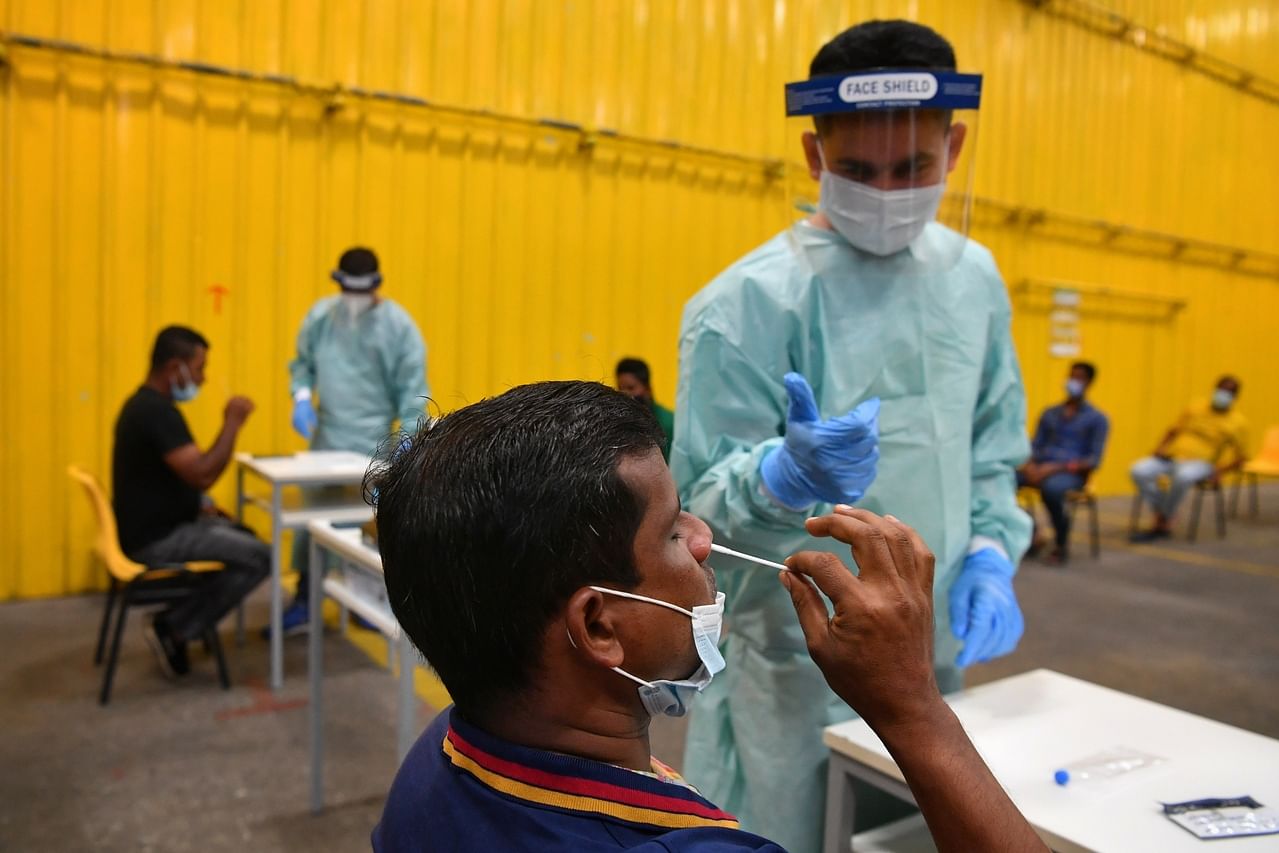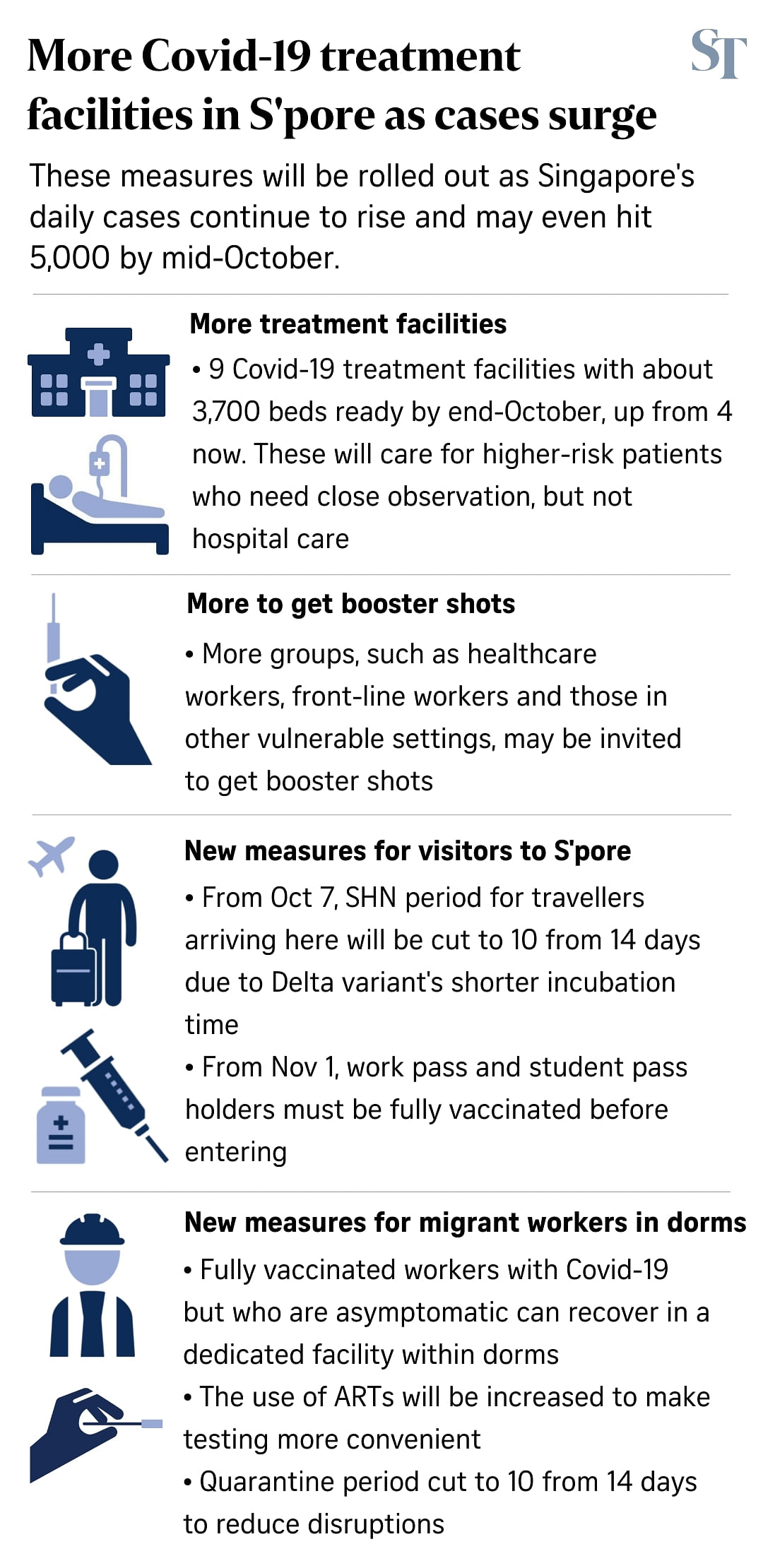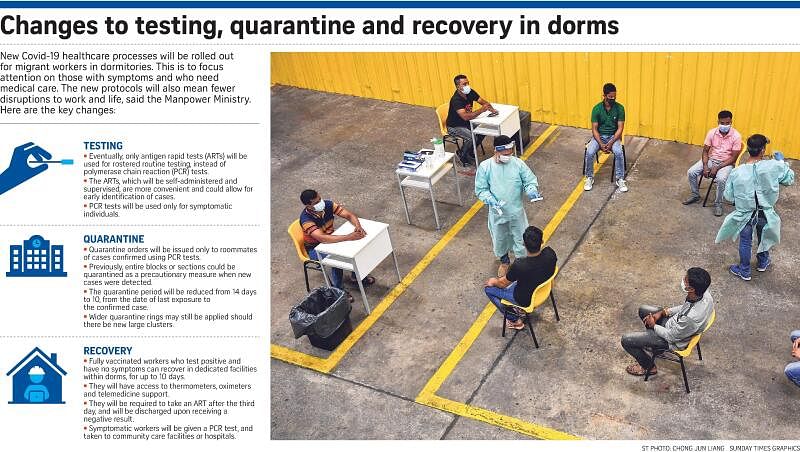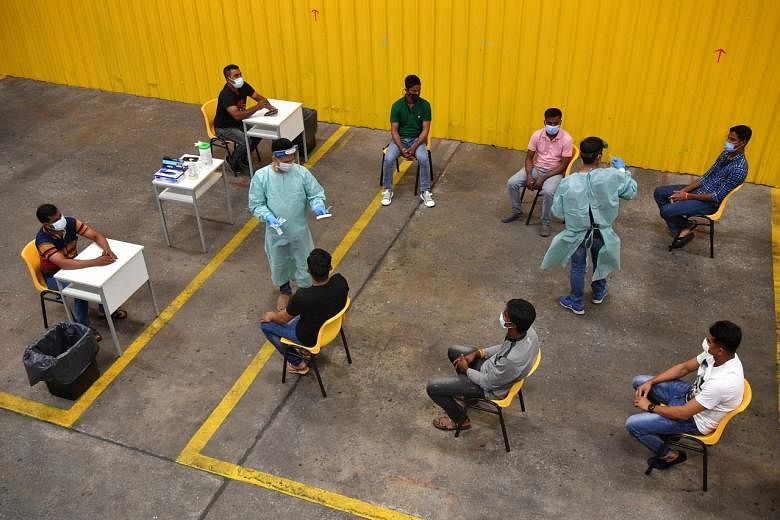SINGAPORE - Covid-19 measures for migrant workers living in dormitories have been revised to focus on those with symptoms and need medical care, the Ministry of Manpower (MOM) said.
The changes will see greater use of fast and less intrusive Covid-19 tests, more tightly-scoped contact tracing and vaccinated and asymptomatic workers with the virus recovering in facilities in their dormitories.
The adjusted measures are in line with current Ministry of Health guidelines for the wider community, and are aimed at reducing disruption to workers' lives and work, MOM said in a statement on Saturday (Oct 2).
Speaking at a multi-ministry task force press conference on the same day, Manpower Minister Tan See Leng noted that there have been more than 500 cases a day in the dorms in the past few days.
This is after months of near-zero cases in dorms since October last year.
"This is a result of the Delta variant being a lot more transmissible, and the dorms have not been insulated from the transmission of the virus. This is just like we have experienced in the community," he said.
But the vast majority of infected workers have very mild or no symptoms and do not require hospitalisation or oxygen support, and instead have been able to recover very quickly on their own, as more than 90 per cent of dorm residents have been fully vaccinated, he added.
This is why MOM is now taking a different approach in managing infections in the dorms, he said.
For instance, regular testing of migrant workers here will shift away from polymerase chain reaction (PCR) tests for asymptomatic individuals to more self-administered but supervised antigen rapid tests (ARTs).
Contact tracing rings will also be tightened to focus on those most at-risk of being exposed to the virus, specifically roommates of Covid-19 cases confirmed by PCR tests. Previously, entire blocks or sections within blocks may be quarantined when new cases are detected.
"This will enable us to further mitigate the risk of further transmissions in the dormitories in a more scalable and also more sustainable manner," he said.
Dr Tan also said that the current pilot programme of weekly community visits for up to 500 migrant workers will continue.
"We will continue to watch the situation closely, and we will progressively ease measures (for migrant workers) where we are able to do so," he said.
Testing
A progressive shift will be made towards using only ARTs for rostered routine testing (RRT), said MOM.
Dormitory residents with acute respiratory illness symptoms should continue to report sick at one of the regional medical centres and a PCR test will be administered if clinically indicated, it added.
ARTs are faster and less intrusive than PCR tests, although they are less accurate.
Workers in the dorms have been trained to use the self-administered ART, said Dr Tan. Instructional materials in their native languages have also been made available.

Tracing
Contact tracing rings will be tightened to focus on those who are most at risk of being exposed to the virus, said MOM.
Dr Tan said on Saturday that these will be the roommates of those who have tested positive on PCR tests.
The roommates and the close contacts of those tested positive on an ART will no longer be quarantined and disrupted from work, he said. They will take an ART and be asked to monitor their own health, and they can continue their lives as usual if negative.
Previously, entire blocks or sections within blocks may be quarantined as a precautionary measure when new cases are detected.
"With dormitories now more resilient, quarantine orders will only be issued to roommates of confirmed cases on PCR test," said MOM.
The quarantine period will also be reduced from 14 days to 10 days. But MOM stressed that wider quarantine rings may still be applied to contain the spread of Covid-19 in the event of new large clusters.
Other residents in the dormitory who are close contacts of a PCR-positive resident may be issued with either a health risk warning or health risk alert via TraceTogether, and should follow MOH's prevailing directions.
Isolating
Fully vaccinated workers who test positive and have no symptoms will be allowed to isolate and recover in a dedicated facility within dormitories for up to 10 days.
These asymptomatic vaccinated workers will have access to thermometers, oximeters for monitoring and telemedicine support, said MOM. These workers will be required to take an ART after day three and will be discharged from the recovery facility upon receiving a negative ART result.
Symptomatic workers will be given a confirmatory PCR test and conveyed to community care facilities or hospitals depending on their condition.
"This will ensure better prioritisation of healthcare capacity for treating serious cases, as well as for other healthcare needs," MOM said.

Vaccinations effective
MOM said the changes will help to "lay the foundation for a more Covid-19 resilient nation".
The ministry said there continues to be strong evidence that fully vaccinated individuals are protected against severe illness.
Of the infected migrant workers, 97 per cent of them had no symptoms. Of the 3 per cent who experienced symptoms, most were mild and a handful were sent to the hospital or community care facilities, said MOM.
None of them were in the intensive care unit and only one of them needed oxygen supplementation, it said.
"This is expected, given that the overwhelming majority of migrant workers are generally young."
Restrictions for migrant workers living in dorms have been gradually eased since last month (Sept).
From Sept 13, up to 500 vaccinated migrant workers from eligible dormitories have been allowed to visit pre-identified locations in the community once a week.
This was more than 16 months after movement curbs were first imposed in April last year.
Dr Tan said that migrant workers will continue to receive the appropriate medical care if and when required.



